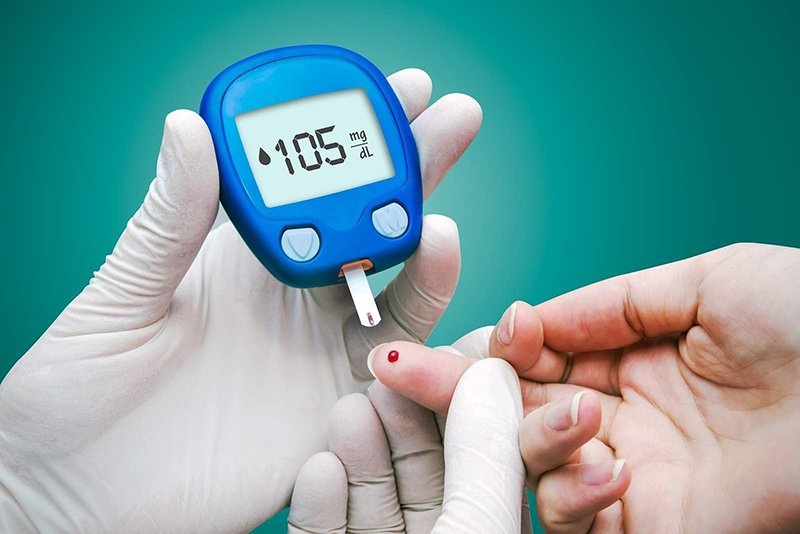What happens to your blood sugar while you're sleeping?
Sleeping habits can affect the action of glucose and insulin in the blood. Therefore, you should maintain regular, physiological sleep, avoid sleeping too late or too much to minimize the risk of diabetes.
1. How is blood sugar at sleep?
Blood sugar during sleep will increase, usually around 4 - 8 am for normal sleep. In healthy people, insulin can control spikes in blood sugar by instructing muscle, fat, and liver cells to absorb glucose from the blood. For people with diabetes or prediabetes, insulin can't do that well, so blood sugar levels go higher.
MORE: Why does blood sugar rise in the morning?
MORE: Why does blood sugar rise in the morning?
2. Sleep Habits and Diabetes
Besides dietary factors and obesity, sleep habits are also linked to diabetes. Studies have found that sleeping habits can affect how well cells respond to insulin.
A study of more than 4000 people on the amount of sleep each night found that those who slept less than 6 hours / night had a lower risk of cells being less sensitive to insulin, which doubled the risk of diabetes. This was true even after the researchers took into account other lifestyle habits.
A study of more than 4000 people on the amount of sleep each night found that those who slept less than 6 hours / night had a lower risk of cells being less sensitive to insulin, which doubled the risk of diabetes. This was true even after the researchers took into account other lifestyle habits.
In addition, other sleep disorders and disruptions such as sleep apnea can also increase the risk of diabetes. Although the reason why sleeping a lot increases the risk of diabetes is not clear, some studies suggest that sleeping more than 9 hours a night may also increase the risk of diabetes.
MORE: Drugs that can raise blood sugar

Chất lượng giấc ngủ có thể ảnh hưởng tới lượng đường trong máu
3. Does lack of sleep increase the risk of diabetes?
Many studies have shown that people who sleep less than 6 hours a night often have irregular, unhealthy eating habits, snacking more. Other research has found that naps can directly affect how the body makes other hormones, which in turn affect blood sugar levels. For example, when you stay up late, your body produces more of the hormone cortisol, which affects insulin action. In addition, there is growing evidence that disrupting the body's circadian clock (circadian rhythm) by staying up at night can make cells more insulin resistant.
In one study, scientists altered the circadian rhythms of 16 healthy volunteers by allowing only 5 hours of sleep per night for 5 nights. When those volunteers ate food at night, a time when their bodies weren't biologically prepared to raise blood sugar, their bodies didn't use insulin properly.
MORE: Not getting enough sleep can wreak havoc on your body
In one study, scientists altered the circadian rhythms of 16 healthy volunteers by allowing only 5 hours of sleep per night for 5 nights. When those volunteers ate food at night, a time when their bodies weren't biologically prepared to raise blood sugar, their bodies didn't use insulin properly.
MORE: Not getting enough sleep can wreak havoc on your body
4. How to improve blood sugar through sleep?
To keep your blood sugar balanced, try to get at least 7 hours of sleep every night. Specifically:
For people who work at night or have many rotating shifts : Try to maintain regular eating and sleeping times, including on days off, if you can. And exercise during rest like walking. For people worried about blood sugar: Regular good night sleep helps your body use insulin effectively. Along with getting enough sleep, avoid eating late at night and try to exercise after dinner. For people with diabetes: If blood sugar is usually high in the morning, talk to your doctor. You may need to monitor your blood sugar continuously to determine the duration and level of abnormal increases and then provide a solution. Adjustments to diabetes medication or exercise routine may be made for people who do not have good blood sugar control. Sleeping habits can affect the action of glucose and insulin in the blood. Therefore, you should perform a balanced sleep, exercise and maintain an appropriate diet.
Để đặt lịch khám tại viện, Quý khách vui lòng bấm số HOTLINE hoặc đặt lịch trực tiếp TẠI ĐÂY. Tải và đặt lịch khám tự động trên ứng dụng MyVinmec để quản lý, theo dõi lịch và đặt hẹn mọi lúc mọi nơi ngay trên ứng dụng.
Reference source: webmd.com
Bài viết này được viết cho người đọc tại Sài Gòn, Hà Nội, Hồ Chí Minh, Phú Quốc, Nha Trang, Hạ Long, Hải Phòng, Đà Nẵng.






